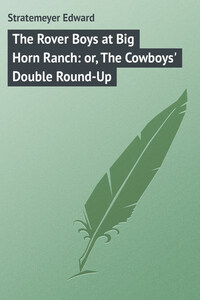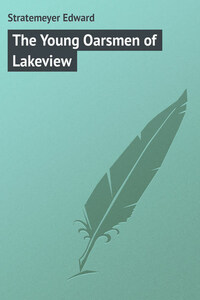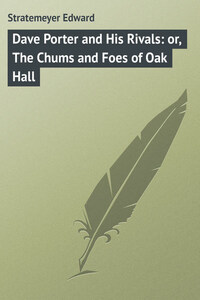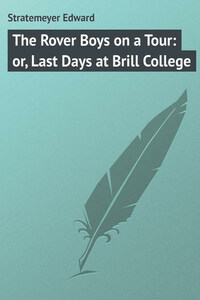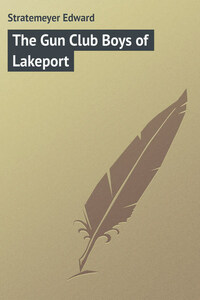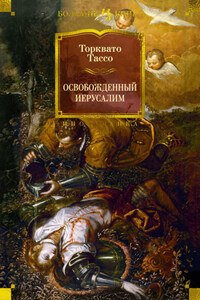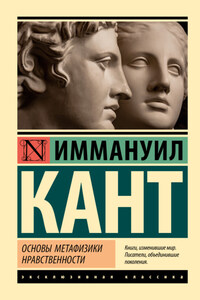My Dear Boys: This book is a complete story in itself, but forms the sixth volume in a line issued under the general title, “The Second Rover Boys Series for Young Americans.”
As noted in some volumes of the first series, this line was started years ago with the publication of “The Rover Boys at School,” “On the Ocean,” and “In the Jungle,” in which I introduced my readers to Dick, Tom and Sam Rover and their relatives and friends. The twenty volumes of the First Series related the doings of these three Rover boys while attending Putnam Hall Military Academy, Brill College, and while on numerous outings.
Having finished their education, the three young men established themselves in business and became married. Dick Rover was blessed with a son and a daughter, as was also his brother Sam, while Tom became the proud father of a pair of the liveliest kind of twin boys.
From their home in New York City the young Rovers were sent to a boarding school, as related in the first volume of the Second Series, entitled “The Rover Boys at Colby Hall.” From that institution of learning the scene was shifted to “Snowshoe Island,” where the lads spent a mid-winter outing. Then they rejoined their fellow-cadets and had some strenuous doings while “Under Canvas.” After that, in a volume entitled “The Rover Boys on a Hunt,” I related how they uncovered the mystery surrounding a strange house in the woods. And following this came a trip to Texas and Oklahoma, where, “In the Land of Luck,” the boys aided Dick Rover in his efforts to locate some valuable oil wells.
In the present volume the scene is shifted back to Colby Hall and then to a ranch in the West where some remarkable happenings await our young heroes.
From reports received I am assured that the sale of this line of books has now passed the three million mark! This is as astonishing as it is gratifying. I sincerely trust that the reading of the volumes will do all of the boys and girls good.
Affectionately and sincerely yours,
Edward Stratemeyer.
CHAPTER I
SNOW AND SNOWBALLS
“Line up, fellows! No crowding ahead in this contest.”
“Here, Jack, give me some elbow room if you want me to do any real snowball throwing!” cried Fred Rover.
“All the elbow room you want,” returned his cousin gayly.
“Remember the prize!” shouted Andy Rover to the cadets who were stringing themselves out in a ragged line. “The first fellow to throw a snowball over the top of the barn gets a sock doughnut.”
“For gracious sake! what do you call a sock doughnut?” demanded Phil Franklin, another cadet, as he paused in the act of rounding up a snowball he was making.
“A sock doughnut is one with a big hole in it,” answered Andy, with a grin.
“Then my socks must be all of the doughnut variety,” put in one of the cadets dolefully. “They are always full of holes.”
“Never mind the socks now!” cried Randy Rover. “Let’s see who can put the first snowball over the barn.”
It was late in the afternoon of a day in January and a number of the cadets of Colby Hall had been amusing themselves in the snow which covered the ground to a depth of nearly a foot. They had started in to snowballing each other, but had then grown more serious and had built several snow forts and likewise two or three snowmen which later they had taken great sport in knocking apart. Then some one had suggested that they try their skill at seeing who could throw, the highest and farthest, and this had led to the present contest.
“We’ll mark off a line about a hundred feet from the main barn,” Jack Rover had announced. “And then we’ll see who can throw highest over the roof.”
The four Rovers were accompanied by half a dozen of their chums and six or eight others, and at the word from Jack the snowballs began to fly at a lively rate, a few landing on the roof of the big barn and the majority hitting the side.
“Say, look out that you don’t break a window,” warned Gif Garrison. “If you do, you’ll have an account to settle with Captain Dale.”
“Here she goes!” yelled Dan Soppinger, and let fly with so much strength that the snowball sailed up to the very ridgepole of the barn and disappeared on the other side.
“Hurrah! Dan draws first blood!” shouted Jack.
“Huh! Dan didn’t throw over the barn, he just slid over it,” snickered Randy.
Jack was hard at work making a small and perfectly round ball. Now, taking careful aim, he let fly with all his might.
“There she goes fair and square,” he announced with pardonable pride, as the snowball cleared the top of the barn by several feet and disappeared beyond.
The snowball had scarcely been thrown when two other balls thrown by Fred and another cadet went sailing over the barn. Then those in the contest seemed to acquire better skill, and soon nearly every one of them was topping the barn with the missiles.
“Phew! some hot work, I’ll say,” panted Will Hendry, usually called Fatty because he was the stoutest boy in the school.
“This exercise will do you good, Fatty,” returned Fred. “You need to reduce.”
“If Fatty keeps on he’ll be eating Colby Hall poor,” announced Spouter Powell.
